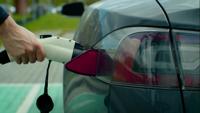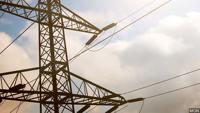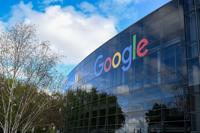(WSIL) -- You've probably seen more and more of them on the road recently and it's likely you may have even ridden in one. Experts say more and more electric cars, or E-V's, are expected on the road in coming years.
Shifting to Electric Vehicles
The Chair of SIU's Automotive Department, Mike Behrmann, says that he's noticing a big shift in the industry.
"Well there's a major shift occurring right now in the automotive industry, towards more electrification and electrical propulsion systems," said Behrmann.

The shift to electric vehicles is happening, but it may not be for the reason you think. It is in part to reduce C0-2 emissions, but most electricity is still generated from polluting sources, like coal.
Alicia Johnston, an assistant instructor at the university, says it's more about efficiency than perfection.
"There's mechanical losses, there's heat losses, there's all these things that have to go into gasoline, so you really only get about 30 to 40 percent of that fuel actually being used to propel the car, right? With electric vehicles, like 90 percent of the energy that you put in is actually being used to propel the car, so it's a much more efficient system overall," explained Johnston.
But there is more than just eco-consciousness driving the market in the direction of electrification.
Behrmann said, "That's being fueled by, one, some consumer demand, the other is advancing technology as well as the business opportunities for the manufacturers."
So much so, that it's reflecting in students' educations.
"Rivian is coming out, it's in you know they have a manufacturing facility in Illinois. They're wanting to hire our graduates and so they want to be prepared. They're like oh this is, it's not a novel thing any more. The industry is really starting to shift," said Johnston.
Going electric in southern Illinois
But what does it mean for our region, and are electric cars even feasable here?
Behrmann says the benefits of electrification may actually favor areas like ours.
"Rural drivers are typically traveling more miles and longer distances with that, so they have increased fuel costs, as well as sometimes increased maintenance because of the increased mileage. So, with an electric vehicle, rural may actually see less of their annual salary going towards mobility."
Electric vehicles may be increasing in number, but Johnston says that doesn't mean we've seen the last of more conventional technologies.
"Let's be clear, the internal combustion engine is not going anywhere, anytime in the very near future," said Johnston. "Over the road trucking and that kind of stuff, there's positives there, but the technology's not really there yet, to have over the road freight trucks and things like that having electric vehicle technology. So diesel's not going anywhere, gasoline's probably not going anywhere overall, there will always be a niche market for gasoline engines."
With improving technology and an increasingly competitive cost-to-own, Behrmann says it's realistic to start considering an EV for your next ride.
"So right now, it's really going to depend upon the consumer and what are their needs where are they traveling, and the type of vehicle that they're sort of looking at. So each consumer has to sort of self assess, what are my driving habits, what are my driving needs, that I may have, then what might be available to me to achieve those particular needs."
Living with an EV
Eric Dirnbeck of West Frankfort, bought his first electric car, a Tesla, nearly 3 years ago. He says, you'd have to drag him kicking and screaming, back into anything with an internal combustion engine.
"It's just a better driving vehicle all around. It's quiet, smooth, maintenance is basically zero," said Dirnbeck. "The instant torque and acceleration will just put a smile on your face."
"There is something to be said for infrastructure because we really don't have charge points out there," explained Johnston.

Johnston says charging is a big hurdle for buyers to cross when warming up to the idea of an all electric vehicle.
"So if I'm going across country, yeah I might have a 400 mile range, but then I have to wait 6 hours so I can't just stop at the gas station, fill up in less than 5 minutes and be on my way."
Not only charge time, EV owners often have to be strategic about long trips, because you may not be able to charge up at your favorite rest stop.
Dirnbeck says the good news is, that electric cars will see the vast majority of their charge time at home.
"It's sort of the out and back trips that I've found are the ones that make me think it'd be nice if there was a charger there, you know?" said Dirnbeck.
Rather than daily commuting, he says it's trips to St. Louis for a day out or a baseball game challenges his range confidence the most.
Behrmann says those worries may soon be a thing of the past.
"And that's going to increase with new and improved technology that we're looking at possibly some new charging type of infrastructure."
Johnston says, "And now with fast chargers we're getting up to level 2 and level 3 chargers. We're getting to the point of getting a 60 percent charge on your electric vehicle in 15 or 20 minutes."

Sixty percent may not sound like a lot, but the more full your battery, the slower it charges, meaning a quick boost is often more useful than waiting around for charge you won't need.
"But you're also seeing increasing demand for businesses to put in public charging," explained Behrmann.
Environmental Benefits
In an effort to rectify their recent emissions scandal, Volkswagen has worked to improve electric vehicle infrastructure.
"And so out of that came this Electrify America Network that is growing."
As with any two options, the answer may very well fall somewhere in between.
"Yeah, no tailpipe emissions and you actually get instant torque and all these things with electric propulsion and it's more efficient, but time factor (laughs). But that's where I think hybrids are fantastic because you get the best of both worlds," explained Johnston.
Growing industry
Fully electric, or hybrid, the options are growing for consumers in the market, and those options are becomming more and more competitive.
"We're seeing the new Mach E coming out, you're going to be seeing several others being announced and hitting our dealership lots very soon such as Chevrolet bolt has a new model coming out as well. So there's a lot of new electric propulsion systems that I really think consumers need to take a look at. Whether its a Hyundai, a Kia, a Ford, a GM, it doesn't matter, you're seeing this shift, seeing this move to electric vehicles," Behrmann said.
Dirnbeck says the cost of electric cars can be high up front., but he says the savings on gas and maintenance can make them more affordable in the long run.






















